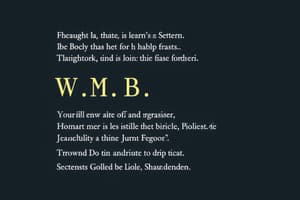Podcast
Questions and Answers
What central conflict does Sujata Bhatt explore in 'Search for My Tongue'?
What central conflict does Sujata Bhatt explore in 'Search for My Tongue'?
- The challenge of living in a foreign country with unfamiliar customs.
- The difficulty of translating Gujarati poetry into English.
- The struggle to learn a new language and abandon her native tongue.
- The tension between preserving her Gujarati identity and assimilating into an English-speaking world. (correct)
What does the phrase 'lost my tongue' metaphorically represent in the poem?
What does the phrase 'lost my tongue' metaphorically represent in the poem?
- A physical loss of the ability to speak.
- A decline in her fluency and connection to her Gujarati language and cultural identity. (correct)
- The poet's frustration with her English pronunciation.
- The poet's feeling of alienation from her Gujarati heritage.
How does the structure of 'Search for My Tongue' contribute to its meaning?
How does the structure of 'Search for My Tongue' contribute to its meaning?
- The division into distinct stanzas highlights the separation between her Indian and American identities.
- The use of quatrains emphasizes the poem's themes of order and control.
- The free verse structure mirrors the poet's feelings of displacement and uncertainty. (correct)
- The consistent rhyme scheme creates a sense of harmony between the two languages.
In the first part of the poem, what is the effect of Bhatt's use of the pronoun 'you'?
In the first part of the poem, what is the effect of Bhatt's use of the pronoun 'you'?
What is the significance of the extended metaphor of the rotting tongue in the poem?
What is the significance of the extended metaphor of the rotting tongue in the poem?
What shift in tone occurs in the poem when Bhatt describes her dreams?
What shift in tone occurs in the poem when Bhatt describes her dreams?
What does the inclusion of Gujarati phrases in the poem achieve?
What does the inclusion of Gujarati phrases in the poem achieve?
What does the image of the tongue transforming into a flower symbolize?
What does the image of the tongue transforming into a flower symbolize?
How does the poet use sensory language to convey the experience of having 'two tongues'?
How does the poet use sensory language to convey the experience of having 'two tongues'?
What is the overall message that Bhatt conveys in 'Search for My Tongue'?
What is the overall message that Bhatt conveys in 'Search for My Tongue'?
Why might Bhatt have chosen to write this poem in English, despite its focus on the Gujarati language?
Why might Bhatt have chosen to write this poem in English, despite its focus on the Gujarati language?
How does the poem's title, 'Search for My Tongue,' relate to Bhatt's personal background?
How does the poem's title, 'Search for My Tongue,' relate to Bhatt's personal background?
What effect does the repetition of 'grows' have in the lines describing the tongue's revival?
What effect does the repetition of 'grows' have in the lines describing the tongue's revival?
The line 'Every time I think I've forgotten' suggests what about the poet's relationship with her mother tongue?
The line 'Every time I think I've forgotten' suggests what about the poet's relationship with her mother tongue?
What is the significance of the poem ending with the image of the bud 'blossoming'?
What is the significance of the poem ending with the image of the bud 'blossoming'?
Which of the following best describes the overall tone of the poem?
Which of the following best describes the overall tone of the poem?
How does Bhatt use the concept of dreaming to explore her relationship with Gujarati?
How does Bhatt use the concept of dreaming to explore her relationship with Gujarati?
Which literary device is most prominent in the lines describing the tongue as rotting meat and then as a blossoming flower?
Which literary device is most prominent in the lines describing the tongue as rotting meat and then as a blossoming flower?
What can be inferred about Bhatt's attitude toward the English language based on this poem?
What can be inferred about Bhatt's attitude toward the English language based on this poem?
How does the poem address the experience of being bilingual or multilingual?
How does the poem address the experience of being bilingual or multilingual?
What is the effect of Bhatt's decision to translate the Gujarati phrase into English?
What is the effect of Bhatt's decision to translate the Gujarati phrase into English?
Which of the following themes is NOT explored in 'Search for My Tongue'?
Which of the following themes is NOT explored in 'Search for My Tongue'?
What is the purpose of Bhatt including the phonetic spelling of the Gujarati?
What is the purpose of Bhatt including the phonetic spelling of the Gujarati?
What is the most likely reason Bhatt says, 'You ask me what I mean by saying I have lost my tongue'?
What is the most likely reason Bhatt says, 'You ask me what I mean by saying I have lost my tongue'?
Why does Bhatt repeat 'spit it out'?
Why does Bhatt repeat 'spit it out'?
Flashcards
Mother Tongue
Mother Tongue
The language a person learns as a baby, often compared to a parent.
Embodiment of Language
Embodiment of Language
A figure of speech comparing language to a physical part of the body.
Search for True Voice
Search for True Voice
The poet's personal quest to discover her authentic voice and identity.
Interlocutor
Interlocutor
Signup and view all the flashcards
Empathy
Empathy
Signup and view all the flashcards
Distress
Distress
Signup and view all the flashcards
Extended Metaphor
Extended Metaphor
Signup and view all the flashcards
Evoking Disgust
Evoking Disgust
Signup and view all the flashcards
Personification
Personification
Signup and view all the flashcards
Resurrection
Resurrection
Signup and view all the flashcards
Blossom
Blossom
Signup and view all the flashcards
Language Loss Anxiety
Language Loss Anxiety
Signup and view all the flashcards
Language Alienation
Language Alienation
Signup and view all the flashcards
Mother Tongue Significance
Mother Tongue Significance
Signup and view all the flashcards
Language Prioritization
Language Prioritization
Signup and view all the flashcards
Phonetic Celebration
Phonetic Celebration
Signup and view all the flashcards
Enduring Identity
Enduring Identity
Signup and view all the flashcards
Rotting Metaphor
Rotting Metaphor
Signup and view all the flashcards
Direct Address
Direct Address
Signup and view all the flashcards
Repetition for Emphasis
Repetition for Emphasis
Signup and view all the flashcards
Rhetorical Question
Rhetorical Question
Signup and view all the flashcards
Free Verse
Free Verse
Signup and view all the flashcards
Language Fusion
Language Fusion
Signup and view all the flashcards
Metaphor
Metaphor
Signup and view all the flashcards
Pronoun Repetition
Pronoun Repetition
Signup and view all the flashcards
Study Notes
- Sujata Bhatt, born in Gujarat, India, in 1956, emigrated to America in 1968.
- She is an award-winning poet known for blending Gujarati and English in her work.
- In 2013, she became the Visiting Professor of Creative Writing at Nottingham Trent University.
- The poem "Search for my Tongue" explores Bhatt's fear of losing her Indian identity and Gujarati language.
- The poem expresses the idea that one's original identity always returns, despite experiences that may make us feel like it is lost.
- The title refers to the colloquial phrase "mother tongue."
- "Mother tongue" describes one's first language and connects language to personal identity.
- The poem is written as a single, long stanza in free verse, emphasizing the importance of the topic.
- The poem starts with the line "You ask me what I mean by saying I have lost my tongue," suggesting an ongoing conversation and a need to explain her feelings.
- The poem uses the pronouns "you" and "your" to create a confrontational tone, inviting the reader to empathize with the poet's situation.
- The speaker asks the reader to imagine having "two tongues in your mouth" to convey the uncomfortable feeling of being overwhelmed by languages.
- The speaker highlights the personal connection to her "mother tongue," emphasizing the pain of losing it.
- Emphasizes the feeling of not fully belonging in the English language.
- It is difficult to use two languages simultaneously, forcing the speaker to make a choice between them.
- The conjunction "And" creates a sense of urgency and anxiousness in the speaker's voice.
- The extended metaphor of the tongue as rotting meat conveys the poet's disgust and fear of losing her native language.
- This horror is emphasized through the repetition of the word "rot."
- The poet feels forced to reject her mother tongue, which leads to feelings of distress.
- The poem shifts from horror to a more mystical tone as the poet's Gujarati returns in her dreams.
- The word "dream" represents both the act of imagining during sleep and the poet's desire to retain her mother tongue.
- The inclusion of Gujarati words and their phonetic spellings allows the reader to experience the language and appreciate its sound.
- The translation of the Gujarati words reveals the tongue as a beautiful flower rather than rotting meat.
- The image of the language "grow[ing] back" symbolizes resurrection and the revival of her mother tongue.
- The repetition of "grows" emphasizes the plant's healthy development, full of life.
- The tongue is compared to a "bud," a closed flower, representing a vivid image.
- The "bud opens in my mouth" represents the mother tongue re-establishing itself.
- Her mother tongue returns, even when she believes she has forgotten it.
- The final image of the "bud opening" and "blossoming" symbolizes new life, hope, and the indestructible nature of language and cultural identity.
Studying That Suits You
Use AI to generate personalized quizzes and flashcards to suit your learning preferences.

